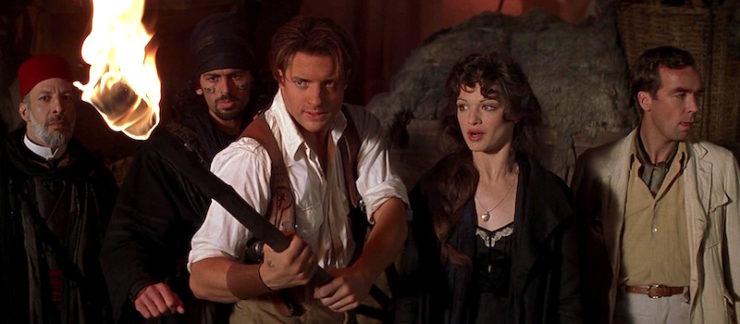It seems that everyone is using Indiana Jones as their inspiration these days. Listen to directors on both Doctor Who and Supernatural describe specific seasons of either show as “our Raiders of the Lost Ark,” or the myriad of filmmakers who bump it to the top of their lists of films that affected them as children, the ones that mattered most in their development into mature movie-type people. Now there’s a plan to reboot the whole thing because we can never really get enough of the famed archaeologist.
But who stacks up against Spielberg’s classics on film? (Do not say National Treasure 2: Book of Secrets.) In other media realms? There’s much to be said for the Lara Crofts and Daniel Jacksons of the world, but they seem to miss out on the key notes that Indy hit.
So I’m nominating the 1999 remake of The Mummy.
What makes The Mummy my top contender against other potential usurpers? After all, many types of entertainment have tried to bank on an Indy-like niche…
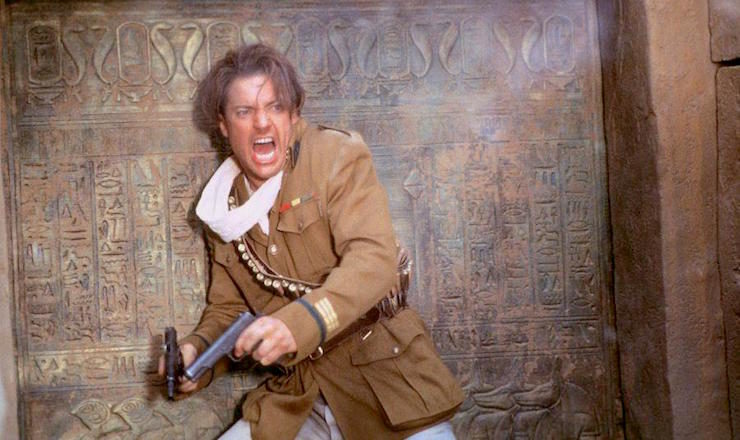
Jones-alikes are aplenty in media, either by character or circumstance. Lara Croft was the most obvious inheritor, and while the Tomb Raider games are still popular, the film series they launched was dismal at best. The studio relied on Angelina Jolie’s sex appeal at the expense of building Croft’s character (unless she was crying to her real-life daddy, Jon Voigt, who is a poor replacement for Sean Connery). Set in the modern day with modern action, the retro gleam that Indy provided was nowhere to be seen—it was all semi-automatics and hanging from marble ceilings. National Treasure was similar in that regard, with a distinct lack of globe-trotting due to being primarily concerned with U.S. history, and we all know that Nicolas Cage—special fella that he is—is no Harrison Ford.
Science fiction films like Stargate might have fit the bill with their pacing and style of action. But even with the ancient history angle filling that archaeological niche, Stargate was oddly too serious to become the next Indy heir. It’s humor was entirely circumstantial, and none of the characters fit an Indiana-like mold—Kurt Russell’s version of Jack O’Neil and James Spader’s Daniel Jackson were arguably pieces of Jones’ character split between two people. Stargate worked as a sci-fi epic, but lacked that rollicking quality that Raiders possessed. The Fifth Element had the humor and Bruce Willis’ Korben Dallas could have played as a future-time Indy, but it lacked the historical vantage point beyond its opening scene, and was built more as a single myth than a serial.
Outside of film, more and more media draws on Indiana Jones for inspiration, and video games seem to be the place to go by and large. From Uncharted to La-Mulana, even goofy little app games like Temple Run, everyone is drawing on that familiar vein of storytelling. But regardless of how much fun it is to be the avatar of a similar character, it’s not the same as enjoying the wit and wonder of an Indiana Jones film.
Which brings me back to my point about The Mummy and how excellent it is, and how I will fight to defend its honor—preferably with a saber.
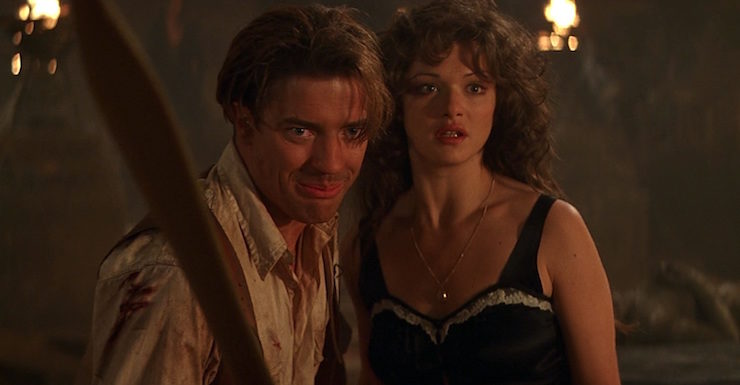
We can safely say that director/screenwriter Stephen Sommers was not aiming anywhere remotely highbrow with his not-even-really-a-remake of The Mummy. His other projects, from Van Helsing to G.I. Joe: Rise of the Cobra, don’t even scrape to middlebrow. It is doubtful that he, like so many current writers/directors/showrunners took his particular treatment of the old Universal classic and thought, I’m gonna do right by Spielberg, though he did mean for his film to bear a resemblance to Jones. Yet regardless of intention, it’s fair to say that this movie—more than your average successor—managed to capture the “spirit” of the Indiana Jones mythos better than anyone. How?
To start, of course, you need the right leading fella to play your quippy action man, Rick O’Connell. Brendan Fraser is nothing like Harrison Ford in terms of his path as an actor—his career has jumped all over the place, and that seems to have suited him. But what Fraser did have that was essential to any Indiana analog (say that five times fast) was the perfect balance of swagger, charm, and silliness. Fraser is goofier than Ford, yes, but he’s rugged enough, willing to get dirty enough, as-good-with-a-sword-as-he-is-with-a-smile enough. And because he was perhaps a more light-hearted incarnation of the type, his counterpart in this journey—Rachel Weisz’s Evelyn Carnahan—was similarly sweetened, a bumbling and eager Egyptologist looking for recognition in a field where women are rarely accepted.
And I’m going to say something that’s going to probably upset a lot of people now; I kind of prefer Evelyn to Marion. Thing is, while Marion is wonderfully no-nonsense and a total hell raiser, her personal stake in Raiders revolves around her having a piece of jewelry that her dad left behind after being a pretty terrible parent. She regards her presence alongside Jones as insurance on her investment in his search for the Ark. But mostly… there are still feelings there and she can’t ignore them. On the flip side, Evelyn is actually the foreword momentum of the story in The Mummy; she’s there because of her expertise, and she is the one who possesses the knowledge to make their expedition successful. Her curiosity is what eggs the plot on, and while Rick is certainly the hero, he’s also technically just her muscle. He’s there to fetch and carry, glare at the rival expedition when they get too entitled, and boggle at her when she puts their lives in danger because, what, reading the Book of the Dead sounds like a great idea, obviously.
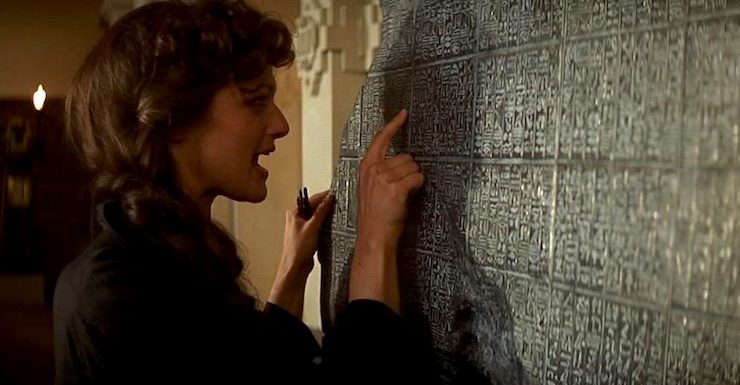
The fact that the film has a villain who is bound to the artifacts is a great angle to play when your story hinges on archaeological discovery. The titular mummy could have come off too hokey for a modern audience, and there are very specific reasons why it didn’t turn out that way. In part, the special effects actually did their job in this film—they delivered something new, but didn’t detract from the story or make the character seem secondary to the flashy CGI. In addition, actor Arnold Vosloo only agreed to take the role of Imhotep if he could cut out the camp on his end; he felt the mummy would be a better baddie if he played it straight, allowing the tragic love story to motivate him rather than magical curse juice. It ties him back to his old Universal black-and-white counterpart, but this Mummy is capable of showing just how far he must go for a woman he’s already died for once.
For all that the story was a goofy romp, it bounced back on moments of levity. It never got quite as serious as Jones perhaps, but even the camp turned on emotional blows—like the death of Captain Winston Havlock, the steady and methodical assimilation of the American treasure hunters, and Imhotep’s genuine pain at losing Anck-Su-Namun for a second time. And rather than making the male hero the only important central figure with a bunch of occasional sidekicks, The Mummy put together a great ensemble of people who all felt important to the core of the narrative. Rick O’Connell is the fighting man on the team, but it’s Evey’s quest, which is prompted by her brother Jonathan’s meddling, and the whole gang would be incapable of making it out alive without the only person who really understands what’s going on, Ardeth Bay. It’s a group effort, which could have easily been an improvement on Indy’s girl-of-the-month and sidekick-per-country style in the long run.
Still, the film is far from perfect and mirrors many of Indy’s blunders, including cringeworthy racial stereotypes, not-even-remotely-accurate history, and ladies getting randomly stuck in their nightgowns during the film’s final act. But if anyone was looking for a movie that offers the same sorts of laughs, thrills, and early 20th century treks into the desert, this is definitely where it’s at.
It’s a shame that the sequels and spin-offs created afterward abandoned most of the strengths of the first film because it would have been a joy to watch a series that stayed true to the tone of The Mummy. (And they should have given Ardeth Bay his own spin-off.) There are certain movies that have tried to establish a similar brand with a twist; in a way, Pirates of the Caribbean is an Indy-style series that features pirates instead of archaeologists. And there’s the Dark Universe reboot, of course, but then we’re back to a modern setting, with a distinctly different aim in establishing a multi-title shared universe. But I’ll always miss the potential that The Mummy represented.
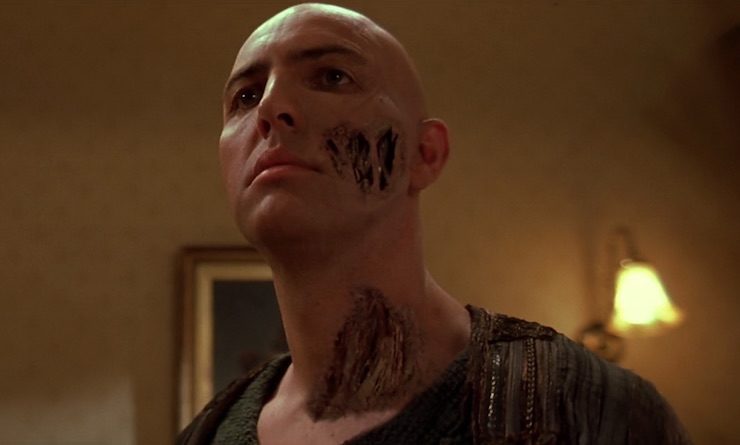
This article was originally published in February 2015.
Emmet Asher-Perrin quotes this film a lot, and no one ever knows what she’s talking about. You can bug her on Twitter and Tumblr, and read more of her work here and elsewhere.










